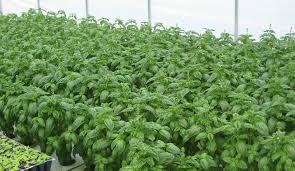 Mint farmers in Kenya are set to double their export of the produce to the United Kingdom and the Netherlands in the peak season that started last month and will run through to March 2020.
Mint farmers in Kenya are set to double their export of the produce to the United Kingdom and the Netherlands in the peak season that started last month and will run through to March 2020.
This comes at a time when the alternative and herbal medicine market is on the rise globally and hence, the players of the mint extract market are anticipated to be rewarded because of the rise.
“During the off-peak, we exported 10 to 15 tonnes a month. However, since the high season started we have been exporting up to 30 tonnes a month,’’ said Patrick Kirimi, the Deputy Parkhouse Manager at Green Blade Growers Limited.
RELATED CONTENT: International exporter contracting farmers to grow herbs
Hexa Research, a UK market research and consulting company reports that the alternative and herbal medicine market was valued at $50.9b in 2017 and is expected to reach $117.02b by 2024 with the leading herbal plants being raw ginger, mint, turmeric, feverfew, and aloe vera among others.
According to Kirimi, from past experiences, demand drops gradually in March from 100 per cent to 80 per cent and by mid-July, it is only at 50 per cent then pick up at the beginning of August.
“This is because the weather is favorable in Kenya during this period as it is the cold season compared to Israel and Netherlands who are our main competitors where it is hot. We end up producing better quality and more volumes,” said Kirimi.
RELATED CONTENT: Community based organization helping farmers grow herbs to benefit from an all-time stable prices
Green Blade Growers Limited produces 90 per cent of its mint for export. It sources the rest from small scale farmers across Gigiri, Naivasha, Limuru, Murang’a and Kitengela.
During this season, the average market price for a kilogram of mint is Sh694.92 thus the company earns an average of Sh20.85m per month.
Farmers who time their produce for harvesting during this peak season can hence maximise on their profits.
Mint also known as mentha, is a type of around 15 to 20 aromatic herb species which include peppermint and spearmint.
RELATED CONTENT: Rising demand for herbs and spices in local and international markets ignites the farming in Kenya
The plant contains an antioxidant and anti-inflammatory agent called rosmarinic acid that is effective in relieving allergies and menthol, a natural decongestant that gives a calm and cooling effect while producing a soothing aroma.
A 2017 report by the University of Helsinki on the use of complementary and alternative medicine in Europe indicates that herbal medicine is being used to remedy health problems where patients consider the help provided by conventional medicine to be inadequate.
Global consumers have turned to mint extract as an alternative for medical purposes to address issues such as smooth muscle spasms, increase blood circulation, relieves headache, antiseptic, morning sickness, nausea, menstrual cramps, flatulence, flu, and vomiting.
Apart from mint, other herbs that are grown by Kenyan farmers include chives, oregano, coriander, basil, rosemary and sage whose demand in both the local and international markets has also risen.
RELATED CONTENT: Seed producer helping 200 culinary herbs farmers access international market for their produce
According to the producers, some of these herbs had gone into extension as farmers turned to grains and cereals production. However, of late farmers are taking the venture back on realising its lucrative markets with stable market price as compared to other produce.
“Many growers in the country had left herbs to grow on their own in the bush despite their health and economic returns. But it is encouraging that the farmers are increasingly growing these plants to better their income,” said George Gathuri, herbs and spices value addition manager at Helitech, a community based organisation in Lari Sub-County, Kiambu County.
He says herbs prices do not fluctuate much in market like they do with other vegetables as most of them are sold directly to wholesalers, where the prices are constant and pretty standard through the year.
















Comments powered by CComment